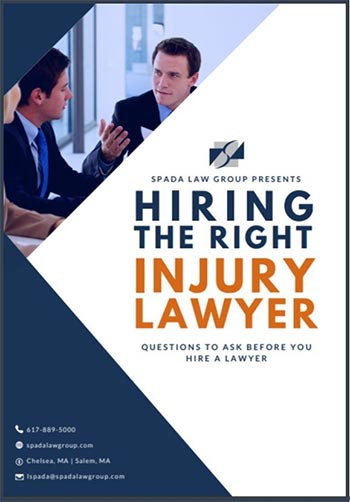What is a Deposition?
 A deposition is a formal meeting that happens before a personal injury case reaches a settlement or goes to trial. In a deposition, an attorney will ask questions under oath to one of the parties of the lawsuit. If you’re a victim in an injury case who is being deposed, your attorney will be at the deposition with you and the other party’s attorney will ask questions while a court reporter creates a record of the meeting.
A deposition is a formal meeting that happens before a personal injury case reaches a settlement or goes to trial. In a deposition, an attorney will ask questions under oath to one of the parties of the lawsuit. If you’re a victim in an injury case who is being deposed, your attorney will be at the deposition with you and the other party’s attorney will ask questions while a court reporter creates a record of the meeting.
Massachusetts allows an opposing lawyer in an injury case to bring in witnesses and the injured party. Spada Law Group can also depose the person who injured you. The meeting is for the attorney to ask questions and learn more facts about the case. This meeting occurs in the office of the attorney asking the questions, or by Zoom if both parties agree to this arrangement.
If, for example, you are a client of Spada Law Group, we would have a deposition with the party that caused your injury. You, as the injury victim, would have a deposition with the attorney from the insurance company representing the person who caused your injury.
How Does a Deposition Fit into the Litigation Process of an Injury Claim in Massachusetts?
Depositions are part of the discovery process of an injury lawsuit in Massachusetts. Discovery is a process both attorneys participate in – the injury lawyer for the victim and an insurance company’s attorney for the person who caused the injury – to exchange information about the injury case. As a whole, the discovery process includes exchanging information, documentation, and conducting depositions.
There is a very open policy in Massachusetts when it comes to conducting depositions and other forms of discovery. Almost everything is on the table, and there are very few limitations unless there is a specific rule or court order against certain disclosures, which is very rare. Generally speaking, there are very few off-limits topics when it comes to depositions and discovery as a whole in Massachusetts injury lawsuits. But, it is important to note, just because a question may be asked and answered in a deposition does not automatically mean the answers to all questions may be admitted later in court. The rules governing evidence will guide a judge later when determining what testimony is admissible and what is not.
Why do Injury Lawyers Take Depositions in Massachusetts’ Injury Lawsuits?
Injury lawyers take depositions to learn as much as they can about your case and the possible defenses the opposing side may assert. By knowing the good as well as the bad of every case, a lawyer is in the best position to properly handle a client’s injury case. After conducting depositions, both sides of the lawsuit will know what’s going to come out at trial. It helps both sides not to have any surprises.
The insurance company’s attorney has similar goals in conducting depositions, only their goal is to protect the insurance company – not you as an injury victim – so their goal is to learn more information to attempt to argue for a lesser settlement for you. Insurance companies will always fight against you after you’ve been injured, which is why it's so important that you have an attorney fighting for you and your rights after an accident and injury.
If you’re deposed as an injury victim, the other party’s attorney will ask you many questions to prepare for trial and they may ask several questions which will not be admissible at trial. In a trial, there are many more rules about what types of questions can be asked, and how they can be asked.
Some of these questions could expose information that might seem problematic, but that’s far from the truth. The truth is, as a personal injury attorney, we need all of the facts of your case. We can deal with “bad” facts in a case, but if we don’t know the full truth it becomes harder to know the best way to argue your case. Sometimes, information can seem bad at face value, but that same information is what can direct the course of how we fight your case so it truly ends up being critical information.
For example: imagine a woman hires Spada Law Group after a slip and fall accident in Star Market. The woman comes in to file a claim, says she slipped and fell and broke her leg and there were no signs up about the wet floor.
Then, when Attorney Spada or Attorney Zolotas deposes the Star Market store manager, he finds out that the store has video of the accident. It turns out, in an unfortunate series of events, another customer had spilled a bottle of water on the ground just seconds before our client walked around the corner and slipped and fell. For our client, this isn’t a good fact because the video helps prove that our client’s injury wasn’t caused due to the grocery store’s negligence and the store had no time to discover the spill and clean it up. These facts, however, may help Attorney Spada better advise his client. The attorneys can now advise the client that a settlement offer should be reconsidered since going to trial isn’t in the client’s best interest.
Why is a Deposition Important to an Injury Lawsuit?
Depositions are important for many reasons. As an injury attorney fighting for people hurt after accidents, depositions of the other party or witnesses help us get a better picture of the whole case. We can learn more facts, good and bad, and discover the best way to position our client and their case.
Depositions are also an important process to take part in as a victim of an accident and injury case. Depositions help the other lawyer (representing the insurance company for the person that injured you) learn more about how your injuries have affected your life. The lawyer will also be able to assess your credibility as a witness and whether or not you’d be a likable witness at trial. These are very important assessments because opposing counsel will then report back to the insurance company. If you make a great witness who is both believable and likable, your chances of settling your case are much higher.
Do I Have to Go to a Deposition?
Yes, if the other party’s attorney in an injury lawsuit in Massachusetts wants to depose you, you have to go to the deposition. This is not like a criminal case where you can, for a time, assert your right to remain silent.
Being deposed is not an option if you are asked to give a deposition. In a way, as an injury victim, you’re obligated to answer questions about the case because you’re seeking damages.
Depositions are not a trial, and many questions may be asked in a deposition that may not be asked about at trial. Remember, though, that this is a two-way street. Your injury attorney also gets to depose the other side and witnesses, so it’s an even playing field. Essentially, any question is “proper” – meaning allowed to be asked – in a deposition if it’s designed to lead to the discovery of evidence that could be admissible in court.
As an injury victim, Attorney Spada would be at the deposition with you. Injury lawyers, however, are not very active in the deposition. The rules governing depositions are very liberal, so there are few circumstances in which an injury attorney would tell their client anything along the lines of: “Don’t answer that question.”
Attorneys can only say that in very limited circumstances. Injury lawyers are present at the deposition to protect you, the client, from any abusive behavior from the opposing party’s attorney and to object to any questions, which are asked improperly. The thing about a deposition though, is you will still be required to answer the question but the record of the deposition will show that your attorney objected and provide a reason.
My Deposition is Coming up, How Can I Prepare?
The most important thing to do before a deposition is to prepare thoroughly with your attorney. They will be able to explain the process more in-depth, answer any questions you have, and address any concerns. They can also go over your case with you, and actually conduct a mock deposition to fully prepare you for the types of questions you may encounter.
The goal of the deposition will be to learn the facts of your case, find the strengths and weaknesses of your case, and learn how good of a witness you would be at trial in terms of credibility and likability.
Injured in Massachusetts? Get a Free Consultation with our Massachusetts Injury Attorney
We take personal injury claims on a contingency fee basis. That means you don’t pay us a dime until we win for you. Schedule your free consultation at our Chelsea office today. We can also meet with you via Zoom, no matter where you live in Massachusetts. In our free consultations, we make every effort to make you feel comfortable as we address all of your concerns and help in any way we can.



